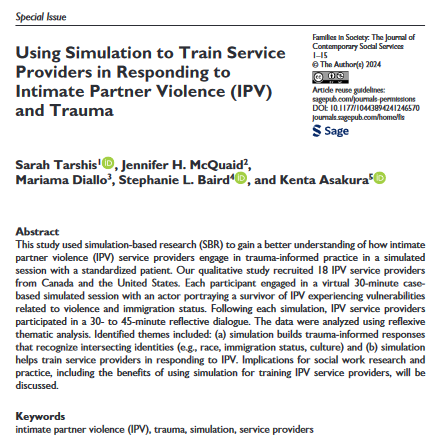 New article alert! Our Lab Research Associate Sarah Tarshis, alongside other scholars including the Lab’s Founding Director Kenta Asakura, recently published the article Using Simulation to Train Service Providers in Responding to Intimate Partner Violence (IPV) and Trauma. The article was published in the Families in Society journal, and it highlights the findings from Dr. Tarshis’ post-doctoral fellowship research at the SIM Lab throughout Spring and Summer 2022.
New article alert! Our Lab Research Associate Sarah Tarshis, alongside other scholars including the Lab’s Founding Director Kenta Asakura, recently published the article Using Simulation to Train Service Providers in Responding to Intimate Partner Violence (IPV) and Trauma. The article was published in the Families in Society journal, and it highlights the findings from Dr. Tarshis’ post-doctoral fellowship research at the SIM Lab throughout Spring and Summer 2022.
This study uses simulation-based research (SBR) to gain a better understanding of how intimate partner violence (IPV) service providers (n = 18) engage in trauma-informed practice with an actor portraying a survivor of IPV experiencing vulnerabilities related to violence and immigration status.The survivor of IPV, played by the trained actor, was named “Taraji.” Participants engaged in a simulated counselling session and worked to explore Taraji’s various intersecting challenges related to immigration status (e.g., deportation threats), culture (e.g., use of religion to justify violence), and other traumatic experiences.
Through the findings, the article suggests that simulation can help build trauma-informed responses that highlight intersecting identities (e.g., race, immigration status, culture), and that simulation can be used to train service providers in responding to IPV. This is particularly important given that IPV service provision is complex and requires service providers to attend to multiple aspects of violence, trauma, identity, culture, and service need—a task which many students and new service providers may feel overwhelmed or unprepared to work with survivors of IPV who have experienced trauma (Tarshis & Baird, 2019).
Check out the article here—it is available open access!